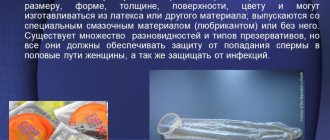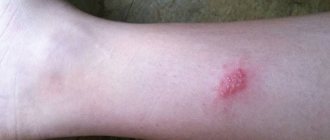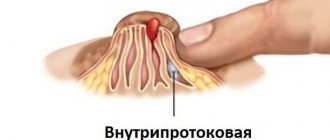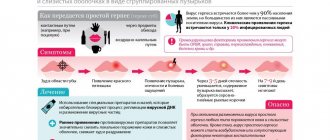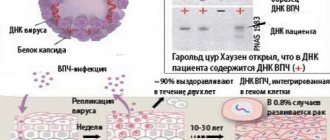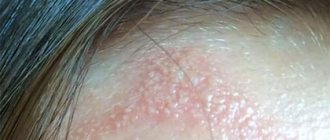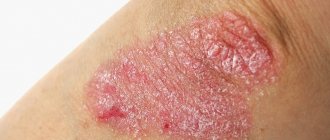Herpes type 4 also has another name - Epstein-Barr virus. The most dangerous complications of this disease are malignant neoplasms; When infected, lymph nodes are affected. Herpes of this variety represents a group of DNA-containing oncogenic viruses.
Herpes type 4 also has another name - Epstein-Barr virus.
Symptoms
Herpes type 4 can exist in the body asymptomatically. Once in the blood and lymph, it remains “hibernating” for years, decades, if a person has a strong immune system. For the first outbreak, the incubation period varies from 5 to 45 days. The length of the incubation period depends on:
- age (older people get sick more often);
- immunity status;
- presence of concomitant diseases.
Exacerbation options: sluggish and acute inflammation. In the first case, a person experiences malaise and weakness. Attributes symptoms to fatigue. When the immune status drops, the situation immediately worsens.
In the second case, the symptoms are vivid:
- temperature jump to febrile values (38-390C);
- weakness;
- a sore throat;
- muscle pain;
- enlarged lymph nodes;
- hemorrhagic rashes.
The absence of rashes does not mean the absence of a virus: the obligatory appearance of vesicles with liquid occurs only with type I herpes. With Epstein-Barr virus, skin manifestations are not always noticeable.
A person, mistaking the symptoms for signs of a cold, is treated at home. You need to be wary if the “cold” is not accompanied by the usual companions:
- fever;
- chills;
- sweating when the temperature drops.
The symptoms indicate the development of infectious mononucleosis, and not the standard ARVI.
Consistently developing:
- Fever and malaise.
- Catarrhal or ulcerative-necrotizing tonsillitis (redness of the throat, yellow plaque, necrosis of some tissue areas).
- Skin rashes similar to those of rubella.
- Yellowing of the sclera.
- Liver damage, enlarged spleen (in severe cases, its rupture).
The disease can go away on its own without treatment in 3-4 weeks with strong immunity.
Important! Contacting a medical facility is necessary, since mononucleosis can cause severe complications on internal organs: heart, kidneys, liver.
Reproduction of the virus is also provoked by viral hepatitis, herpetic sore throat, and multiple sclerosis.
With hepatitis, the liver becomes inflamed, the sclera and skin turn yellow (there are manifestations without changes in the color of the whites of the eyes and skin), and severe intoxication occurs. Treatment is mandatory - without it, chronic hepatitis develops, as a result of which the chances of the outcome of the disease in the form of cirrhosis are high.
Herpetic sore throat is severe. It is distinguished from the usual by a sharp rise in temperature up to 400C and the presence of red blistering rashes on the tonsils. Antiviral drugs and, if necessary, antibiotics are used for treatment.
Multiple sclerosis is an autoimmune disease that disrupts the functioning of the central or peripheral nervous system. Leads to disability; there are no medical cures yet.
conclusions
When it enters the body, the virus parasitizes the lymphatic and nervous systems, penetrating into their elements for life. It causes a number of serious diseases that are accompanied by a deterioration in the functionality of internal organs and do not always manifest external signs in the form of herpetic rashes, unlike some types of viruses.
It is diagnosed only with the help of additional laboratory tests, and treatment is carried out with medications, on an outpatient basis for the chronic form, and in isolation for the acute form. Following simple preventive rules reduces the risk of infection or relapse.
Other manifestations of exacerbation of the virus
Herpes virus type 4 causes, in addition to mononucleosis and other benign diseases, the uncontrolled proliferation of atypical cells, which leads to the development of cancer. This happens infrequently, however, when diagnosing a type 4 virus in adults and children, you should be careful about your health and take sick leave even if you have a cold, since the first symptoms are sometimes similar to the onset of ARVI.
Thus, nasopharyngeal carcinoma, which sometimes develops in those infected with the Epstein-Barr virus, gives symptoms:
- bloody purulent discharge from the nose;
- weakness;
- temperature rise.
A person has blocked ears and hears tinnitus. Measures need to be taken urgently. The decision on treatment tactics is within the competence of the oncologist.
Burkitt's lymphoma is life-threatening. It has 2 forms. The first is abdominal. The second is generalized. They proceed differently.
| Form of the disease | Symptoms |
| Abdomial | Disruption of the digestive system. Damage to the liver, intestines. Cases of intestinal obstruction. |
| Generalized | Degenerative changes in spinal tissue. A person loses the ability to coordinate movements. |
Bone tissue is destroyed and the patient loses teeth.
Burkitt's lymphoma has a favorable prognosis with early treatment. If the disease has not spread to the internal organs, a complete recovery is possible. Chemotherapy is used, and the patient is prescribed vitamin complexes.
Advanced cases are less treatable. A bone marrow transplant may be required. They use schemes (in combination) with drugs:
- vincristine;
- methotrexate;
- cyclophosphamide;
- eposide.
In the first stage of the disease, the five-year survival rate is 73%. With the fourth – a little more than 20%.
Traditional medicine recipes
It must be remembered that the use of alternative methods of treating herpes must be agreed with the attending physician.
The most common methods of traditional medicine:
- The use of choleretic tinctures is recommended, since the virus lies dormant in the pancreas. To make the tincture, you need to take a teaspoon of one of the dry herbs: immortelle, tansy or corn silk, pour one glass of boiling water and let it cool. Strain the solution and warm it up a little before using. It is recommended to drink the tincture fifteen minutes before meals. The course of treatment should continue for a month,
- in case of exacerbation of the disease, it is recommended to make a tincture of viburnum. It is necessary to chop four tablespoons of viburnum berries and add boiled water. Leave to infuse for four hours. Drink half a glass of the solution four times a day,
- Drinking fresh aloe juice also helps relieve exacerbation of the disease. To do this, you need to drink one teaspoon three times a day before meals. You can use the juice as an antiseptic to moisten inflamed areas. It is not recommended to use aloe juice if you have hemorrhoids, kidney failure, or during pregnancy.
Diagnostics
Not every case of detection of the Epstein-Barr virus in a patient’s blood leads to the formation of tumor tumors and malignancy of cells. Researchers have identified a geographic dependence. The development of nasopharyngeal carcinoma and Burkitt's lymphoma is observed in residents of Asian and African countries. Diseases are practically not found in the countries of the former USSR.
The population of the CIS is characterized by infectious mononucleosis, when atypical mononuclear cells are detected in large quantities in the blood of the patient. These are cells similar to monocytes (have one nucleus). An increase in their numbers indicates an immune response to the irritant - type 4 herpes virus.
If, based on the existing symptoms, the doctor suspects the presence of the Epstein-Barr virus, he will give the patient a referral for a blood test. Reveal:
- atypical mononuclear cells;
- leukocytes in quantities exceeding the norm;
- antibodies to herpes type 4.
An obligatory stage of diagnosis is ultrasound. The condition of the spleen and liver is examined.
The doctor performs a visual examination and palpation of the lymph nodes. With an active virus, the lymph nodes become enlarged and painful:
- cervical;
- submandibular
A swab is taken from the throat if there is plaque on the tonsils.
When tumor processes develop, a biopsy is performed so that the oncologist can see the picture of the disease and prescribe treatment.
If the disease develops aggressively, the doctor gives a referral to determine the presence of HIV in the blood, because it is HIV-infected patients who develop complications in the form of oncological processes.
Treatment
Asymptomatic carriage does not require treatment. It means that the virus is in a dormant state in which it cannot cause harm.
An exacerbation is a reason for immediate action, since without medical intervention the disease can lead to complications leading to disability and even death.
In mild cases, doctors focus on antiviral drugs. The patient constantly monitors his well-being, temperature, and heart function.
Severe conditions caused by the virus are accompanied by intoxication and dehydration. The patient is treated in a hospital setting. To eliminate the effects of dehydration, droppers with a water-salt solution and glucose are used.
Temperatures above 380C are treated with antipyretic drugs: ibuprofen, paracetamol.
When a bacterial infection occurs, antibiotics are prescribed by injection or tablets. The choice depends on the patient’s individual sensitivity to the active ingredients of the drug. Apply:
- metronidazole;
- sumamed;
- amoxicillin;
- flemoxin solutab;
- and others - the spectrum is wide.
Provide vitamin support to the body. To speed up the action of vitamin complexes, they are prescribed by injection.
Swelling of inflamed tissues is relieved with orazone and hydrocortisone.
There are 2 main components of treatment. These are drugs:
- antiviral;
- immunomodulatory.
The first group includes:
- acyclovir;
- valacyclovir;
- ganciclovir.
The second includes:
- sandoglobulin;
- interferon;
- interferon A.
The task of the doctor and the patient is to stop the multiplication of the virus at an early stage, so that it does not have time to give rise to the development of complications.
Basic principles
Herpes in children involves the use of drugs whose action is aimed at inhibiting the reproduction process of the pathogen, its destruction and removal from the body, increasing the body's immunoreactivity, alleviating the general condition, preventing the development of relapses and treating concomitant diseases. Treatment of this infection is ensured by comprehensive measures, in particular the prescription of antiherpetic drugs, immunostimulants and some other drugs. Treatment of herpes in children becomes more effective if the treatment regimen includes systemic immunomodulators, for example, Viferon Suppositories. This drug belongs to the group of recombinant interferons and has a pronounced antiviral and immunomodulatory effect.
Transmission routes
Herpes virus type 4 is transmitted:
- by airborne droplets;
- through blood.
These 2 ways are the main ones. The likelihood of “catching” the virus is higher at times when the immune system weakens. Wounds, cuts on the skin, inflammation of the gums - this increases the chances of infection.
Transmission of the virus through sexual contact and from mother to child is possible.
To avoid infection, each member of a family who is infected with the Epstein-Barr virus (including the inactive form) should have a separate towel and a separate set of dishes. It is unacceptable to share a comb with several family members.
The risk of contracting the virus in a newborn is low, since he remains under the protection of the mother’s immunity for some time.
Prevention
If infectious mononucleosis has already been diagnosed and herpes virus type 4 is found in the blood, the patient, after the symptoms subside, receives immunity from this disease for the rest of his life.
If a virus is detected in the blood, but it does not manifest itself, it’s time to start strengthening the body’s defenses.
Prevention includes:
- hardening;
- balanced diet;
- maintaining good physical shape;
- combating existing chronic diseases.
Start hardening by pouring alternately warm and cool water, gradually accustoming the body to contrast.
Make time every day for vigorous walks in the fresh air. Movement speeds up metabolism, causing the immune system to work more efficiently. Start your day with a run in the park or a brisk walk, making this 20-minute stretch a regular part of your daily schedule.
Do stretching, swimming or aerobics. A person who is in good shape, even if sick, recovers much faster and rarely suffers from serious complications.
Nutrition requires a thoughtful approach. Eliminate salty, fried, carcinogens: all this complicates the functioning of the gastrointestinal tract, causes inflammation and stagnation in the intestines, thereby facilitating the path of the virus. It has been proven that in the presence of normal microflora in the intestines and its proper functioning, diseases are less likely to bother a person. Include fermented milk products and vegetables and fruits in your diet.
To minimize the risk of uncontrolled reproduction of the virus, keep chronic diseases under observation: get tested, take preventive courses, prolong remission. If the body is weakened by the fight against a disease (exacerbation of pyelonephritis, ulcerative colitis, gastritis, tonsillitis), it does not have the strength to suppress the cells modified by the virus. As a result, diseases are layered on top of one another.
Pay special attention to diseases that are within the competence of the otolaryngologist:
- rhinitis;
- pharyngitis;
- tonsillitis.
The virus “likes” to concentrate in the tissues of the upper respiratory and lymphatic systems. Prevent exacerbations twice a year when seasonal exacerbations are likely.
Detection of the Epstein-Barr virus in the blood is not a reason for despair, but for a review of lifestyle. Many live with the virus without health consequences and find out about it by chance, during a routine examination for another reason.
Knowing about the presence of the virus, you can be more attentive to colds and flu, consult a doctor in time, and therefore minimize the chances of complications.
5 / 5 ( 4 voices)
